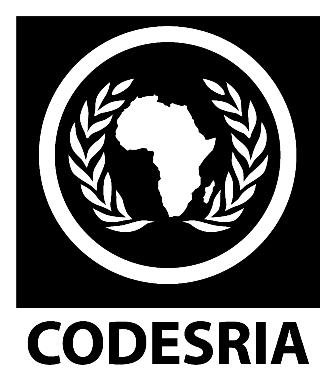IBM: Inviting Applicants to Support their Climate Change or Environmental Projects
August 17, 2017
The Darwin Initiative: Seeking Applications for Post Project Funding
August 17, 2017Application deadline: September 30, 2017
Number of visits: 1393
Established in 1973, the Council for the Development of Social Science Research in Africa (CODESRIA) promotes research by African and Diaspora scholars in the Social Sciences and Humanities that can contribute to a better understanding of Africa and its place in the world. This is done in the belief that sound knowledge of the continent is invaluable to efforts to make Africa a better place for its peoples and societies.
Within the framework of the 2017-2021 Strategic Plan, CODESRIA introduces the Meaning-Making Research Initiative (MRI) as its principal tool for supporting research. Like previous tools, MRI will focus on supporting research that contributes to agendas for imagining, planning and creating African futures. MRI replaces five tools that CODESRIA had deployed in previous years to support research. These were National Working Groups (NWG), Multinational Working Groups (MWG), Comparative Research Networks (CRN), Transnational Working Groups (TWG) and postdoctoral grants. One goal of this move is to increase the legibility and visibility of the research supported by the Council by collapsing previous tools into a single initiative and therefore reducing the number of tools deployed to support research.
The adoption of MRI marks a recommitment to the tasks of interpretation and explanation that saw CODESRIA produce ground-breaking work on thematic issues such as democratization and economic reform in Africa. MRI will more aggressively push scholars to build on the close observation of African social realities to grapple with the tasks of explanation, interpretation and efforts to come to terms with and surpass challenges in Africa. The initiative will be marked by reinforced support to researchers and their better integration into the Council’s work. It will also systematically give scholars more varied ways to present their work, including through books, journal articles and policy interventions.
Key selection criteria: Projects funded under the broad MRI initiative, for which those submitting proposals under this call will meet many of the following criteria:
• Propose research on important aspects of African social realities that fall under CODESRIA’s priority themes as outlined in the CODESRIA Strategic Plan;
• Be guided by clear questions that explore puzzling aspects of the social realities of Africa and its position in the world;
• Be grounded in the thorough exploration of the continent’s social realities and history;
• Engage constructively and rigorously with African futures;
• Be theoretically ambitious with a clear goal of providing new and innovative ways of
understanding and making sense of African social realities;
• Explore multiple spatial, temporal and sectoral settings where this contributes to the process of meaning-making
• Demonstrate familiarity with knowledge already produced by CODESRIA
Special call on higher education governance, research and policy in Africa
Proposals accepted in response to this call will be funded by a grant from the Carnegie Corporation of New York to CODESRIA under CODESRIA’s Higher Education Policy Engagement Initiative (HEPI). HEPI seeks to contribute to the better governance of African universities with a focus on enabling them better achieve their core functions of teaching, research and policy engagement. The main tools of HEPI include research, research capacity enhancement, multi-stakeholder convenings, publications and dissemination of research findings. HEPI forms part of CODESRIA’s attempt to complement its support to individual scholars with an effort at strengthening the institutional basis of higher education institutions that produce and provide a space for the work of these scholars. Interventions under HEPI target universities in Ghana, Nigeria, Kenya, Uganda, T anzania, Mozambique and South Africa. All projects must engage cases in these countries. The scholars undertaking these projects, however, do not have to be from or be based in these countries.
Group initiatives: MRIs under this special call should be groups of researchers from one country or multiple countries. Each group should have between 3 and 5 members and should take into account CODESRIA’s core principles of gender, linguistic, intergenerational, interdisciplinary diversity. All members of a group should have a demonstrated ability to contribute meaningfully to the work of the group. The Council offers up to USD 35,000 for each winning project.
Thematic priorities: CODESRIA seeks projects addressing the third of its three thematic priorities which focuses on higher education and research in Africa. Under this broad theme, proposals should focus on the following sub-themes:
1. Broadening stakeholder engagement in Higher Education governance: Collaboration and partnerships between higher education institutions and various stakeholders, including civil society, the private sector and donors. The impact of these collaborations and partnerships on the ability of these institutions to improve their governance, teaching, research, and the transfer and uptake of knowledge; and to increase their legitimacy, and capacity to raise funds.
2. Data and higher education governance and performance: The collection, analysis, use, storage and governance of data by universities and the quality of training, research, institutional planning, management, monitoring and evaluation and communication in institutions of higher education.
3. Leadership and innovative pedagogies: The links between reforms in university governance on one hand and innovative pedagogical interventions, improvements in the quality and quantity of research, student performance and satisfaction, and the assessment of university performance by other sectors on the other.
4. The role of middle level academics: The role of middle level academic officials, including deans, heads of departments, officials of academic staff unions and course coordinators in the coordination of academic programs, university governance, teaching and research .
Cross-cutting themes: Applications should indicate the ways in which some of these cross-cutting themes are integrated in the proposals: these are gender, generations, inequality, rurality and urbanity, memory and history, as well as futures and alternatives
How to apply
Interested applicants should submit application packages containing the following required materials as Word documents. Please note that applications that lack any of these elements will be discarded.
• A proposal with the following clearly titled sections: an introduction; statement and contextualization of research question; brief review of literature and/or competing hypotheses; study design and research methodology; theoretical and practical significance of the study; research plan and a brief summary of budget. All proposals should engage cases from one or more of the following countries- Nigeria, Ghana, Kenya, South Africa, Tanzania and Mozambique. Proposals must be submitted as Word documents and should not exceed 10 pages long (font type: Times New Roman; font size: 12; line spacing: double). Brief budgets should be incorporated into proposals and should take into consideration the fact that these grants have strict 18-month lifespans. CODESRIA will directly fund launch and completion workshops. The budget should cover expenses for the following:
- Field and/or archival research to be undertaken
- Books and other scholarly materials purchased for the project
- Honorariums paid to researchers during field and/or archival research
• Annotated plan of deliverables: One-page annotated table of contents for book or annotated plan for three scholarly articles to be produced as deliverables of the project.
• A cover letter listing full details- names, email and physical addresses and telephone number- of the members and coordinator of the project
• CVs of the members of the project, including full contact details
• Institutional affiliation: A letter indicating institutional affiliation of each member
• Identification sheet: A completed version of the identification sheet attached to this call.
Please leave the document as an Excel file.
The deadline for submission of applications for both individual and group grants is September 30, 2017. Notification of the result of the selection process will be done by October 30, 2017 and applicants who will not hear from us by then should consider their applications unsuccessful. All applications should be sent by email to 2017 Research Initiatives Program, CODESRIA at mri@codesria.sn. When sending your email kindly use the subject line ‘MRI HE 2017’ to facilitate the processing of your application.
Research Program CODESRIA
BP 3304, CP 18524 Dakar, Senegal
Tel: +221 – 33 825 9822/23
Fax: +221- 33 824 1289
E-mail: mri@codesria.sn
Website: http://www.codesria.org
Called from: http://www.codesria.org






